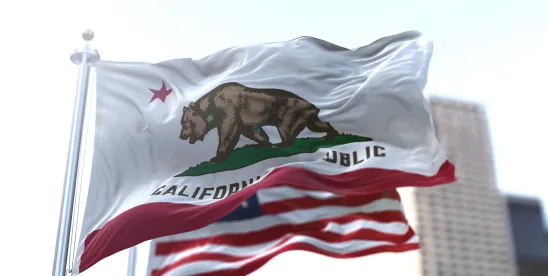The California Legislature and Governor Gavin Newsom have again enacted a number of laws that will affect California employers.
This Insight summarizes the significant changes to California employment laws taking effect in 2025. Unless otherwise indicated, the laws discussed below will take effect on January 1, 2025.
Intersectionality Protections and Definition of “Race” in Anti-Discrimination Laws Clarified
In a nationwide first, as we previously explained, California now explicitly recognizes the concept of “intersectionality” within the state’s anti-discrimination laws. The legislation (SB 1137) clarifies that the Unruh Civil Rights Act, the Education Code, and the Fair Employment and Housing Act (FEHA) all prohibit discrimination based not only on individual protected characteristics but also on the basis of the intersection or any combination of those characteristics.
Another bill, AB 1815, further amends FEHA to clarify the definition of “race” by removing the word “historically” from the provision that race is inclusive of traits associated with race, including hair texture and protective hairstyles. By way of background, California passed the Create a Respectful and Open Workplace for Natural Hair Act, known as the CROWN Act, in 2019, codifying that race discrimination includes discrimination based on hairstyles, such as braids, locs, and twists. AB 1815 removes the word “historically” from the phrase “traits historically associated” because it was vague and confusing in application.
Note that these FEHA amendments will apply both retroactively and prospectively because they are declaratory of existing law.
Local Enforcement of Anti-Discrimination Laws
Existing state law expressly authorizes only the California Civil Rights Department (CRD) to enforce complaints of employment discrimination. SB 1340 will change that by authorizing cities, counties, and other political subdivisions to enforce their own employment discrimination laws as long as those laws are at least as protective as the state’s laws.
Under SB 1340, any city, county, or political subdivision can enforce its own laws prohibiting discrimination in employment if the local enforcement:
- concerns an employment complaint filed with the CRD,
- occurs after the CRD has issued a right-to-sue notice,
- commences before the time to file a civil action expires, and
- is pursuant to a local law that is at least as protective as FEHA.
Changes to California Paid Sick Time and Leave Laws
Expanded Paid “Safe” Leave
AB 2499 amends the Healthy Workplaces Healthy Families Act, the state’s paid sick leave law, to expand what is often referred to as “safe time” or “safe leave” by:
- permitting employees to take time off in connection with a “qualifying act of violence,” which includes domestic violence, sexual assault, stalking, or acts involving bodily injury or death, a dangerous weapon, or a threat of physical injury or death (previously, paid sick leave for safe time was limited to victims of domestic violence, sexual assault, and stalking);
- making paid safe leave available not only to employees who are victims of qualifying acts of violence but also to employees whose family members are victims of qualifying acts of violence; and
- providing that the definition of “family member” for purposes of this law is the definition stated by the California Family Rights Act (CFRA), which includes a child, parent, grandparent, grandchild, sibling, spouse, domestic partner, or “designated person” (any individual related by blood or whose association with the employee is the equivalent of a family relationship and identified by the employee at the time the employee requests leave).
These enhanced safe leave purposes for using paid sick time do not increase the total amount of paid sick time that employees have available. We wrote about the 2024 updates to these requirements here.
Expanded Unpaid Safe Leave Protections
In addition to enhancing the “safe” purposes for which paid sick leave may be used, AB 2499 also expands the rights of employees to take unpaid leave for reasons related to qualifying acts of violence. Existing law allows employees to take unpaid time off to appear as a witness pursuant to a subpoena or court order or to obtain relief, such as a restraining order, to protect themselves or their children.
Employers with at least 25 employees must also now allow not only employees who are victims of qualifying acts of violence to take unpaid leave for purposes defined in the statute but also employees whose covered family members are victims of qualifying acts of violence.
The purposes for which the employee may take leave are:
- To obtain or attempt to obtain any relief, including, but not limited to, a temporary restraining order, restraining order, or other injunctive relief, to help ensure the health, safety, or welfare of the employee or family member.
- To seek, obtain, or assist a family member to seek or obtain, medical attention for or to recover from injuries caused by a qualifying act of violence.
- To seek, obtain, or assist a family member to seek or obtain services from a domestic violence shelter, program, rape crisis center, or victim services organization or agency as a result of a qualifying act of violence.
- To seek, obtain, or assist a family member to seek or obtain psychological counseling or mental health services related to an experience of a qualifying act of violence.
- To participate in safety planning or take other actions to increase safety from future qualifying acts of violence.
- To relocate or engage in the process of securing a new residence due to the qualifying act of violence, including, but not limited to, securing temporary or permanent housing or enrolling children in a new school or childcare.
- To provide care to a family member who is recovering from injuries caused by a qualifying act of violence.
- To seek, obtain, or assist a family member to seek or obtain civil or criminal legal services in relation to the qualifying act of violence.
- To prepare for, participate in, or attend any civil, administrative, or criminal legal proceeding related to the qualifying act of violence.
- To seek, obtain, or provide childcare or care to a care-dependent adult if the childcare or care is necessary to ensure the safety of the child or dependent adult as a result of the qualifying act of violence.
The length of the permissible unpaid leave may vary. Employees taking leave as a victim of a qualifying act of violence for any of the applicable qualifying reasons above may be eligible for up to 12 weeks, to run concurrently with leave under the federal Family and Medical Leave Act and/or CFRA, if applicable. Employees taking leave in connection with a covered family member who is a victim may be limited to 10 days, up to five days of which can be for purposes of relocation.
Additionally, while this leave is generally unpaid, as set forth above, employees may use any available paid sick time during the leave.
Employees may also request reasonable accommodations for the safety of the employee while at work. Reasonable accommodations may include transfer, reassignment, modified schedule, changed work telephone, permission to carry a telephone at work, changed workstation, installed lock, assistance in documenting a qualifying act of violence that occurs in the workplace, an implemented safety procedure, or another adjustment to a job structure, workplace facility, or work requirement.
AB 2499 also moves these provisions, along with jury and witness leave protections, from the Labor Code to the Government Code (FEHA) to allow for enforcement by the CRD rather than the Department of Labor Standards Enforcement.
The CRD will post a form entitled “Survivors of Violence and Family Members of Victims Right to Leave and Accommodations” on its website that employers will need to provide: (i) to new employees upon hire, (ii) to all employees annually, (iii) at any time upon request, and (iv) any time an employee informs an employer that the employee or the employee’s family member is a victim.
Expanded Paid Sick Leave Use for Agricultural Workers
SB 1105 amends California’s Healthy Workplaces Healthy Families Act to allow agricultural employees to use paid sick leave for additional specified reasons. Employers will be required to provide paid sick days to agricultural employees who work outside and request sick leave to avoid smoke, heat, or flooding conditions created by a local or state emergency, including when their employer’s work site is closed for these conditions. California Labor Code Section 9110, referenced in the new law, defines an “agricultural employee” as a person employed in any of the following: (i) an agricultural occupation, (ii) an industry that prepares agricultural products for the market, on the farm, or (iii) an industry that handles products after harvest. This amendment is stated to be declarative of existing law to the extent the time off is necessary for preventative care.
Employers May No Longer Require Employees to Use Vacation Prior to Using Paid Family Leave Insurance
Under AB 2123, employers will no longer be able to require employees to use paid vacation time before accessing paid family leave insurance benefits under California’s Paid Family Leave Program (PFL). PFL provides benefits to individuals taking time off to care for a covered family member with a serious health condition, to bond with a new minor child, or to assist family members on active military duty. Prior to the passage of AB 2123, employers could require employees to use up to two weeks of their accrued vacation time before employees could access PFL benefits.
Limitations on Requiring Job Applicants to Have a Driver’s License
SB 1100 aims to reduce unequal treatment of individuals who do not have a driver’s license by eliminating the ability of employers to impose this requirement unless specific conditions are met. Under SB 1100, it will now be an unlawful employment practice for employers to include statements about the need for a driver’s license in job applications, advertisements, and postings, or require applicants to have a driver’s license, unless the employer (i) reasonably expects driving to be one of the job functions of the position, and (ii) reasonably believes that an alternative form of transportation would not be comparable in travel time or cost to the employer. An “alternative form of transportation” includes, but is not limited to, ride-hailing services, taxis, carpooling, walking, or bicycling.
As a reminder, FEHA also defines discrimination on the basis of national origin to include discrimination against an individual on the basis of possessing certain types of driver’s licenses and identification cards.
Prohibition of Captive Audience Meetings
The California Worker Freedom from Employer Intimidation Act (SB 399) prohibits “captive audience meetings” wherein employers hold mandatory meetings or communications for the purpose of communicating an opinion about religious or political matters, including labor organizations. Specifically, employers are prohibited from subjecting or threatening to subject an employee to discharge, discrimination, or retaliation for declining to attend such a meeting or declining to listen to an employer’s communications regarding such matters. Thus, employers would be prohibited from requiring employees to attend an employer’s information session regarding a union organizing campaign, even if it is scheduled during work hours and employees are paid for their time attending. An employer that violates this law will be subject to a civil penalty of $500 per employee for each violation. There are some enumerated exceptions, including for religious, political, educational, and nonprofit organizations.
With the passage of SB 399, California joins many other states, including Connecticut, Hawaii, Illinois, Maine, Minnesota, New York, Oregon, Vermont, and Washington, in enacting laws that prohibit captive audience meetings. As states have enacted such laws over the past few years, an ongoing question has been whether the federal National Labor Relations Act (NLRA) preempts such state laws; the U.S. Chamber of Commerce has challenged such state laws as preempted by Section 8(c) of the NLRA. However, on November 13, 2024, the National Labor Relations Board ruled that captive audience meetings are unlawful. It remains to be seen how this decision will be enforced, whether it will withstand further legal challenge, and how it may affect enforcement of the various existing state laws banning captive audience meetings.
New Requirements for Social Compliance Audits
Under AB 3234, an employer that has voluntarily subjected itself to a social compliance audit to determine, in whole or in part, whether the employer is in compliance with child labor laws must post on its website a report detailing the findings of the employer’s compliance with child labor laws. This law does not require employers to conduct audits. AB 3234 defines “social compliance audit” as an employer’s voluntary, nongovernmental inspection or assessment of its operations and practices to verify whether it complies with state and federal labor laws, including, but not limited to, wage and hour and health and safety regulations, including those regarding child labor. While this definition is broader than child labor law compliance, the posting requirement only appears to apply to the findings of the employer’s compliance with child labor laws.
Until and unless the state issues further guidance, the law leaves open a number of questions. For example, no detail is included as to how long after an audit an employer has to post the results, how long the results need to be posted, or if the employer is permitted to replace out-of-date audit results with new audit results. It is also not clear if the posting requirement relates only to minors working in California. No specific penalties for violating this posting requirement are included in the law.
Workplace Violence Law Restraining Order Provisions Expanded to Include Harassment
Under SB 428, California’s workplace violence restraining order law will be expanded to cover certain kinds of workplace harassment. Supporters of SB 428 argued that employers should not have to wait for conduct to escalate to violence to seek court intervention. Under existing law, employers may seek a restraining order against individuals who engaged in workplace violence or credible threats of violence against employees. Under SB 428, employers will also be able to seek a temporary restraining order against an individual who has harassed employees. SB 428 defines “harassment” for purposes of this law as a knowing and willful course of conduct directed at a specific person that seriously alarms, annoys, or harasses the person and that serves no legitimate purpose. The course of conduct must be that which would cause a reasonable person to suffer substantial emotional distress and must actually cause substantial emotional distress.
Workers’ Compensation Notice Amendments
California employers are required to inform employees about their rights and benefits under California’s workers’ compensation system. These obligations were expanded by AB 1870 to require employers to include in their workers’ compensation notices (i) the employee’s right to consult an attorney for advice about workers’ compensation law, and (ii) that attorneys’ fees will be paid in most instances as part of the injured employee’s award. Employers must also still display an informational poster in a location frequented by employees, provide new employees with a workers’ compensation pamphlet, and provide injured employees with a Claim Form (DWC1) and Notice of Potential Eligibility.
Required Whistleblower Protections Poster
California employers are required to display prominently a list of employees’ rights and responsibilities under the whistleblower laws, including the telephone number of the whistleblower hotline. In compliance with AB 2299, the Labor Commissioner has developed a model poster, which is now available.
Summary Judgment Motion Deadlines
California employers with pending litigation matters should also be aware that the deadlines for motions for summary judgment are changing in 2025. Pursuant to AB 2049, motions will now need to be filed no later than 81 days before the hearing. Oppositions will be due 20 days before the hearing, and reply briefs will be due 11 days before the hearing. The prior deadlines were 75, 14, and five days, respectively.
Protection for Freelance Workers
Finally, following other states nationwide, such as Illinois and New York, Governor Newsom signed SB 988, the Freelance Worker Protection Act (FWPA). The FWPA aims to provide greater protections to bona fide freelance workers, also known as independent contractors. The law imposes minimal requirements for agreements between freelance workers and hiring parties, including the following key requirements:
- Written Contracts: Contracts for freelance work of $250 or more must be in writing and contain certain information regarding the services to be provided and the dates by which services will be rendered.
- On-Time Payment: Payment for freelance work must be made by the date specified in the contract, or within 30 days after completion of the work if no due date is specified in the contract.
- Anti-Retaliation: Hiring parties are prohibited from discriminating or taking adverse action against freelance workers for exercising their rights under the FWPA, including protesting violations or seeking enforcement of the FWPA.
- Records: Hiring parties must retain copies of their contracts under the FWPA for at least four years.
The law also includes a one-sided prevailing plaintiff attorneys’ fee provision.
Importantly, hiring entities should remember that this new law does not impact existing California law that sets forth specific and difficult-to-meet tests for determining which workers may be properly classified as independent contractors in the first instance. We wrote about this here.
What California Employers Should Do Now
- Review and revise workplace policies to:
- reflect that discrimination based on the intersectionality, or combination, of two or more protected characteristics is prohibited;
- remove any requirement that employees use accrued vacation prior to accessing PFL insurance benefits from the state;
- include the new “safe” purposes for using paid sick leave; and
- include the new leave entitlements for employees who are victims of qualifying acts of violence and whose family members are victims of qualifying acts of violence.
- Remove the requirement of a driver’s license from any application materials or job postings unless the conditions of the new law are met.
- Consult with counsel before conducting any voluntary wage and hour or health and safety audit that might include child labor law compliance.
- Ensure that workplace postings and onboarding materials account for the amended workers’ compensation notice requirements.





 />i
/>i

